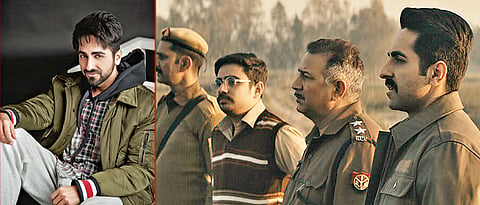‘As an artist, you have a social responsibility’
Ayushmann Khurrana is one of the bankable actors of Bollywood. His films are not only engaging and entertaining but they also have a subtle message attached to them. Last year, both his films Badhaai Ho and Andhadhun turned out to be box-office wonders.
This year is more about experimentation for the actor. He is playing characters and working on stories he hasn’t attempted before. It starts with Anubhav Sinha’s investigation drama — Article 15, in which he plays a police officer. The film is inspired by real incidents and deals with rape and murder of three innocent girls in rural Uttar Pradesh because of caste discrimination.
Article 15, also stars Isha Talwar, M Nassar, Manoj Pahwa, Sayani Gupta, Kumud Mishra and Mohammed Zeeshan Ayyub. It’s produced by Anubhav and Zee Studios and is slated to release on June 28. Ayushmann calls Anubhav a great director, thinker and writer and says that it’s an honour to work with him.
Later this year, the actor will play a gay character in Shubh Mangal Zyada Savdhaan. He is yet again collaborating with Shoojit Sircar in Gulabo Sitabo, which also stars Amitabh Bachchan. His filmography has left his fans excited.
Excerpts from an interview:
The need to tell the story of ‘Article 15’
The talented actor says that Article 15 is one of the most relevant and important films of our times and this story therefore needed to be told. “For the first time, we are speaking about caste system and caste divide which is the need of the hour. Even in 2019, we see a lot of cases happening in our country but nobody is talking about them. The problem is that we have started treating them normally,” he says.
Casteism is deep-rooted
It’s a common belief that casteism is most rampant in smaller cities. Most people living in big cities aren’t aware of how deep-rooted the issue is. Did he encounter the ugly side of casteism in personal life ever? Ayushmann replies, “No, coming from the privileged class, I was quite protected like that, but yes, it’s rampant in villages because they wear their caste on their sleeves. That doesn’t happen in urban India. You see a lot of inter-caste marriages, which you won’t see in rural India because of incidents like honour killing,” he says.
Breaking away from his image
Most of his films have been comedy and rom-coms. Was Article 15 an attempt to break away from his onscreen image and from a certain genre of films that he has been working in? The actor explains, “No, the aspiration was not to change the genre but to do a film which was relevant more than anything else. Yes, this is my first film which is hard hitting, the first in which I am playing a guy who is not vulnerable but is in control of the situation. I am not really the victim of circumstances; I am trying to be a master of them. I am trying to fix this situation in my own possible way. ”
Ayushmann says that so far he has been playing boyish characters but in Article 15, he is more matured. “Both the genre and the character are different,” he says.
Fan reactions
The audience go to theatre expecting three hours of entertainment. Isn’t he nervous about how the audience will react to a serious and intense film like Article 15?
“My success in the past few years has given me the confidence and courage to do a film like Article 15. As an artist, you have a social responsibility and this is that film. This project is my passion,” he says, adding, “We are not thinking about a certain opening numbers or clocking certain numbers at the box office. We just want the film to reach out to a lot of people. Of course, the audience has increased over the years, so it makes the film mainstream. Until now, none of the mainstream films showed the caste divide publicly like the way Article 15 does but at the same time, I think it will be well received and whosoever watches it, will like it. It will create a debate and trigger discussions towards the betterment of our society,” he says.
The pressure of being a bankable star
After delivering numerous hits, he is considered as one of the most profitable actors at the box-office. Does it put pressure on him? “No. In fact, it gives me courage. It’s a happy pressure to have. It’s positive expectation because people expect something worthy out of me, certain kind of content out of my films, which is great. It encourages me to follow my gut, like I have done in the past. Until now, my intuition has really supported me and I hope it supports me in future as well,” says Ayushmann.
The definition of stardom
For most actors, the definition of stardom changes over the years. Ayushmann says that for him, stardom is just being consistent with one’s choices and content. “Everybody has their own different concepts of stardom. For me, it is consistency and choosing different subjects, having films that you will be always be proud off, receiving love and respect from people for your film,” he says.
Playing a gay character
He is one of the few mainstream actors who is playing an LGBTQ character, which many might think is a risk. “It’s part of market risk to play a homosexual character. Also, I feel strongly for the LGBTQ community. I have a lot of friends from that community. I have seen over the years that even after letting go of Section 377, there are biases towards them and you really need a mainstream film to curb those biases and let it out to the common masses,” he concludes.


